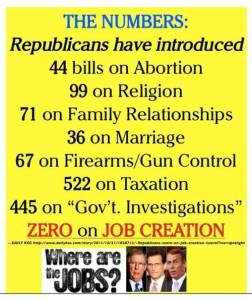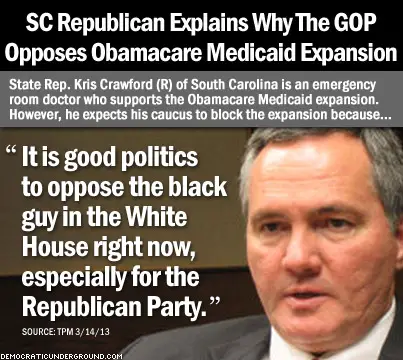Re: Is It In The Best Interest Of The GOP/Libertarians For Them To Sabotage the Econo
source: NPR
GOP To Make 31st Attempt To Repeal Obamacare Act
The House Rules Committee takes up a bill Monday called the "Repeal of Obamacare Act." And just like it says, the bill would wipe away the president's Affordable Care Act. A vote of the full House is planned for Wednesday.
It's the first legislative response from House Republicans after the Supreme Court upheld the law. But it is far from the first time the GOP has voted for repeal.
Over the past 18 months, the House has taken 30 floor votes to try to repeal, defund or dismantle the health care law. The first attempt came on Jan. 19, 2011 just two weeks after the GOP took control of the House.
On that day, Rep. Mike Pence,R-Ind., had this to say, "And today, House Republicans are going to stand with the American people and vote to repeal their government takeover of health care lock stock and barrel."
And that's exactly what House Republicans did, all 242 of them. They were joined by just three Democrats. But the measure languished in the Democratic-controlled Senate.
"Even in some bizarre universe where the Senate passed it, President Obama wouldn't sign it into law," says Sara Binder, a senior fellow at the Brookings Institution and an expert in legislative gridlock.
But the House's efforts haven't been necessarily pointless. Binder says votes like the one planned for later this week are all about scoring political points.
"Much of what we see during split party control of Congress, is this message politics, which is the parties taking their chamber and using it to pursue a policy agenda that appeals to their party base," Binder says.
"I think we can agree that this is a vote that the American public has called for and a vote that we owe the American public," said Rep. Rodney Alexander, R-La., speaking in favor of his effort back in April of 2011 to pull funding from the health care law.
It passed the House on an almost purely partisan vote with criticism from Democrats like Connecticut Rep. Rosa DeLauro, "Mr. Speaker instead of working to create jobs, reduce the deficit and do the business of the American people, this majority has been consumed for months now with trying to repeal health care reform."
The measure failed in the Senate. Defunding and repeal efforts large and small have been tucked into everything from defense appropriations to student loans. A handful of smaller items have made it all the way through to a presidential signature. But most have failed or stalled in the Senate.
So, why try again? Why a 31st vote for repeal?
"We want to show people we are resolved to get rid of this," said House Speaker John Boehner, who appeared on CBS's Face the Nation on July 1.
Boehner said the law needs to be ripped out by its roots, and then replaced.
"And while the court upheld it as constitutional," Boehner added, "they certainly didn't say it was a good law."
The only real chance for Boehner and his Republican colleagues to get their way lies with the November election, and possibly an arcane budget procedure known as reconciliation.
For that to work, Mitt Romney would have to win the presidency, Republicans would have to maintain control of the House and win the Senate. When it comes to the Senate, it's virtually impossible for Republicans to get the 60 vote majority needed to overcome a filibuster. And that's where reconciliation comes in. Certain budget bills can go around the filibuster and only need 51 votes to pass.
But Sarah Binder at Brookings says the process would be procedurally challenging.
"It's complicated for Republicans to achieve this, but there is a vehicle if they can carefully calibrate their bill," she says.
That's a whole lot of ifs. And there are questions about if even that could repeal the whole law.
One thing that's not in question, though, is the outcome of Wednesday's expected vote on the Repeal Obamacare Act. Like so many similar efforts in the past, it will pass the House, with overwhelming Republican support.
source: NPR
GOP To Make 31st Attempt To Repeal Obamacare Act
The House Rules Committee takes up a bill Monday called the "Repeal of Obamacare Act." And just like it says, the bill would wipe away the president's Affordable Care Act. A vote of the full House is planned for Wednesday.
It's the first legislative response from House Republicans after the Supreme Court upheld the law. But it is far from the first time the GOP has voted for repeal.
Over the past 18 months, the House has taken 30 floor votes to try to repeal, defund or dismantle the health care law. The first attempt came on Jan. 19, 2011 just two weeks after the GOP took control of the House.
On that day, Rep. Mike Pence,R-Ind., had this to say, "And today, House Republicans are going to stand with the American people and vote to repeal their government takeover of health care lock stock and barrel."
And that's exactly what House Republicans did, all 242 of them. They were joined by just three Democrats. But the measure languished in the Democratic-controlled Senate.
"Even in some bizarre universe where the Senate passed it, President Obama wouldn't sign it into law," says Sara Binder, a senior fellow at the Brookings Institution and an expert in legislative gridlock.
But the House's efforts haven't been necessarily pointless. Binder says votes like the one planned for later this week are all about scoring political points.
"Much of what we see during split party control of Congress, is this message politics, which is the parties taking their chamber and using it to pursue a policy agenda that appeals to their party base," Binder says.
"I think we can agree that this is a vote that the American public has called for and a vote that we owe the American public," said Rep. Rodney Alexander, R-La., speaking in favor of his effort back in April of 2011 to pull funding from the health care law.
It passed the House on an almost purely partisan vote with criticism from Democrats like Connecticut Rep. Rosa DeLauro, "Mr. Speaker instead of working to create jobs, reduce the deficit and do the business of the American people, this majority has been consumed for months now with trying to repeal health care reform."
The measure failed in the Senate. Defunding and repeal efforts large and small have been tucked into everything from defense appropriations to student loans. A handful of smaller items have made it all the way through to a presidential signature. But most have failed or stalled in the Senate.
So, why try again? Why a 31st vote for repeal?
"We want to show people we are resolved to get rid of this," said House Speaker John Boehner, who appeared on CBS's Face the Nation on July 1.
Boehner said the law needs to be ripped out by its roots, and then replaced.
"And while the court upheld it as constitutional," Boehner added, "they certainly didn't say it was a good law."
The only real chance for Boehner and his Republican colleagues to get their way lies with the November election, and possibly an arcane budget procedure known as reconciliation.
For that to work, Mitt Romney would have to win the presidency, Republicans would have to maintain control of the House and win the Senate. When it comes to the Senate, it's virtually impossible for Republicans to get the 60 vote majority needed to overcome a filibuster. And that's where reconciliation comes in. Certain budget bills can go around the filibuster and only need 51 votes to pass.
But Sarah Binder at Brookings says the process would be procedurally challenging.
"It's complicated for Republicans to achieve this, but there is a vehicle if they can carefully calibrate their bill," she says.
That's a whole lot of ifs. And there are questions about if even that could repeal the whole law.
One thing that's not in question, though, is the outcome of Wednesday's expected vote on the Repeal Obamacare Act. Like so many similar efforts in the past, it will pass the House, with overwhelming Republican support.















